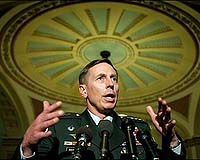| . |  |
. |
United Nations, N.Y. (UPI) Mar 25, 2009 The link between transnational crime and terrorism has been debated often but France took the initiative to the United Nations to highlight national security risks posed by the problem. The large-scale growth in international crime "above all drug trafficking and transnational organized crime, is having a growing impact on states' security and, beyond, on regional and international stability and security," said Gerard Araud, the French permanent representative at the United Nations. He said the problem now afflicted all crisis regions from West Africa, Haiti to Afghanistan. "When the consequences of the activity of these criminal networks threaten international peace and stability, it is the responsibility of the Security Council to deal with them," Araud said, pointing out that so far the crime and drug issues had been relegated to other U.N. bodies outside the Security Council. "Such threats," he warned, "can weaken or destabilize states, damaging their good governance and slowing their economic development. They compete with legal economic systems and promote corruption," the envoy pointed out. "They hamper the post-crisis reconstruction efforts of public institutions and development organizations led by national authorities and the international community." Araud said, "Criminal networks not only benefit from weak or failed states; their activities also help to exacerbate political tensions, inter alia, by financing nongovernmental armed groups and insurgency movements." Moreover, he pointed out, the links between the various drug trafficking networks and international terrorism seem to be getting stronger. "Due to their transnational character, these threats can destabilize entire regions; challenging them demands close international and regional cooperation with a view in particular to strengthening the capacity of weaker states through technical assistance." Citing the 11-year-old U.N. Convention against Transnational Organized Crime, Araud questioned its effectiveness because "we can only observe that criminal networks have learned since then to adapt and to take advantage of changes that have occurred in our societies, be it in improved information and communications technologies or the opening up of financial markets." A Congressional Research Service report in January about international terrorism and transnational crime cited the most pressing issues for consideration by the U.S. Congress. The report examined "the confluence of transnational terrorist and criminal groups and related activities" and evaluated possible motivations and disincentives for cooperation between terrorist and criminal organizations. The report also looked at the scope of crime-terrorism links and the types of criminal activities, from fundraising, material and logistics support to exploitation of corruption and gaps in the rule of law that were used by terrorist organizations to sustain operations.
Share This Article With Planet Earth
Related Links
 U.S. generals push for Arab-Israeli peace
U.S. generals push for Arab-Israeli peaceBeirut, Lebanon (UPI) Mar 23, 2009 Much of the pressure on U.S. President Barack Obama to get tough with Israel over West Bank settlements is coming from America's top generals who have been warning for months that the United States is in danger until it brokers a Middle East peace treaty. "There are important powerful lobbies in America But no lobby is as important, or as powerful, as the U.S. military," wrote Middle ... read more |
|
| The content herein, unless otherwise known to be public domain, are Copyright 1995-2010 - SpaceDaily. AFP and UPI Wire Stories are copyright Agence France-Presse and United Press International. ESA Portal Reports are copyright European Space Agency. All NASA sourced material is public domain. Additional copyrights may apply in whole or part to other bona fide parties. Advertising does not imply endorsement,agreement or approval of any opinions, statements or information provided by SpaceDaily on any Web page published or hosted by SpaceDaily. Privacy Statement |